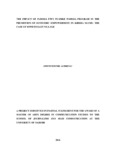The Impact of Pamoja Fm’s Tuamke Pamoja Program in the Promotion of Economic Empowerment in Kibera Slums: the Case of Soweto East Village
Abstract
Media is segmented when it comes to news and information; different media have different audience groups dependent on their preferred channels in search of news and information. Media has the capacity to promote development but more so electronic media. Kibera has had consistent economic challenges since independence in terms of low income, high unemployment, high birth rates and high infant mortality. However, since independence, a lot of economic interventions have and continue to be tried in Kibera among the poor slum dwellers. Such interventions have to a large extent been supported by print media campaigns and coverage by international media organizations. Pamoja FM station, also known as the „„the voice of Kibera‟‟ is the first one of its kind, owned by one of the slum dwellers and produces programs based on participatory production formats. It is because of the central role of this community radio station that my study sought to examine the impacts of Pamoja FM‟s Tuamke Pamoja program in the promotion of economic empowerment in Kibera slums: Economic empowerment in this study focused on the retail business activities that have and continue to thrive in the slums. Soweto East Village, one of the 14 villages in Kibera was selected as my case study. The literature review was divided into 3 main categories with the first part of literature discussing the fundamental roles of community radio in Kenya, Africa and the rest of the world, the second part discussed the challenges faced by community radios in achieving their core mandate, and in our case with regards to economic empowerment and the third being the possible solutions to the sustainability challenges. My study was guided by Social Judgment Theory and Communitarian Theory. My study was qualitative and data gathered were through key informant interviews in addition to consulting secondary data from various sources. Some of my key findings from this study indicated that majority of the locals have significantly and continue to benefit from Tuamke Pamoja programme aired on Pamoja FM Station. The radio discussions according to the study had enabled the residents to come together and form welfares and Sacco‟s that have enabled them to obtain loans for further business expansions. The study also revealed that a large number of the respondents have operational retail businesses. The study also revealed that a larger number of respondents do not listen to Pamoja FM. This was attributed to the timing of their programs of interest and interferences of its frequencies in their neighborhood. Of significance however, is the fact that the study revealed that a large number of respondents were familiar with Tuamke Pamoja Program and that the community radio had adopted a participatory approach in the development of its program contents. The study revealed that there were better financial planning and stock evaluation among the respondents due to the economic tips given by the media personalities of Pamoja FM. It was observed that 41.5% experienced challenges while trying to access the broadcasts aired at Pamoja FM. These they attributed to jammed caller lines, frequency interference by outside broadcasters, lack of signal clarity and the timing of some useful programmes weren‟t good enough since most of the people were at work. My study has therefore concluded that the enduring popularity of radio is an indication of the continuing versatility of radio as a medium of mass communication in spite of the growth in other forms of mass media .The case of Pamoja FM demonstrates that community radio is indeed a critical catalyst and facilitator of economic empowerment, proceeding from the interpretation of the information gathered by this case study. To this end, my study recommends that the community radios should come up with various funding initiatives to generate income, they should consider partnering with the devolved government to widen their operations and there is need for the community radio to engage the regulator so as to review various legal and policy framework to enable them have more ways of generating income.
Publisher
University of Nairobi
Rights
Attribution-NonCommercial-NoDerivs 3.0 United StatesUsage Rights
http://creativecommons.org/licenses/by-nc-nd/3.0/us/Collections
The following license files are associated with this item:


